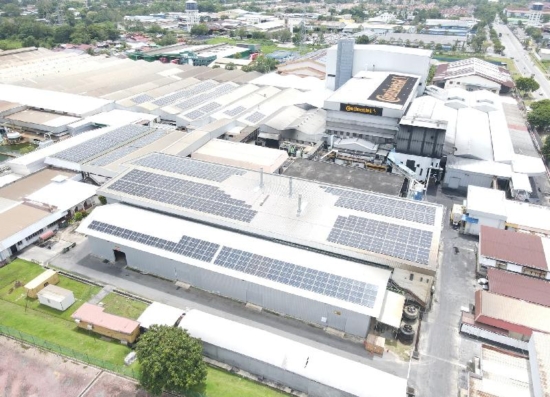Continental cuts 150 Gigawatt hours from annual energy consumption
 New photovoltaic system at Continental's tyre plant in Alor Setar, Malaysia (Photo: Continental)
New photovoltaic system at Continental's tyre plant in Alor Setar, Malaysia (Photo: Continental)
Through the implementation of 160 energy-saving projects, Continental Tires reduced its annual energy requirements by around 150 gigawatt hours in 2023. It achieved this saving by focusing on utilising more renewable energy sources and improving thermal insulation across its operations. This energy saving could power some 12,500 family homes for a year, considering an average annual household consumption of 12,000 kilowatt hours.
“We are generating more and more of our own electricity thanks to the massive expansion of photovoltaic systems. At the same time, we are driving a wide range of projects to make our operations even more energy efficient. In 2023, for example, we have saved a total of 150 gigawatt hours of energy. Each of our tyre plants is working on individual and company-wide solutions to achieve climate-neutral production by 2040 at the latest,” says Dr Bernhard Trilken, Head of Manufacturing and Logistics at Continental Tires.
CDP recognition for 6th year
Energy plays a crucial role in the tyre industry, particularly in processes such as steam generation for vulcanisation. By enhancing steam generation efficiency, Continental slashed its CO2 emissions by 31,000 tonnes in 2023 alone. Continental Tires already consumes 22 per cent less energy per metric tonne of tyres produced compared to the industry average, a commitment to reducing carbon footprint that has earned recognition from the Carbon Disclosure Project (CDP) for the sixth consecutive year. CDP included Continental in the Climate A List 2023. Additionally, Continental has participated in this environmental ranking for twelve years, earning an “A-” grade for its climate protection efforts last year.
Continental continues to pursue energy efficiency and transition to zero-emission energy sources. In 2023, the company installed photovoltaic capacity totalling 26.2 megawatts peak across several tyre plants, facilitating the generation of up to 27.9 gigawatt hours of green electricity annually. It expanded facilities at its Hefei (China), Rayong (Thailand), Hanover (Germany), Korbach (Germany) and Lousado (Portugal) plants and built a new installation in Alor Setar (Malaysia).
The company achieved additional energy savings by installing insulation on pipes, hoses and tyre presses that reduces heat loss to the atmosphere. Around a quarter of the 150 gigawatt hours saved in 2023 were achieved in this way. In 2023, Continental installed insulation in the Camacari (Brazil), Púchov (Slovakia) and Timisoara (Romania) tyre plants and installed a heat pump in Otrokovice (Czech Republic).
Conversion to LED lighting
Continental is also reducing its electricity consumption by converting all conventional lighting in its tyre plants to LED lighting. Last year, it installed LED systems at tyre plants in Púchov (Slovakia), Otrokovice (Czech Republic), Timișoara (Romania), Hefei (China) and Hanover (Germany), among others. By using LED lighting, Continental saved a total of 9 gigawatt hours in 2023.
Looking ahead, Continental aims to reduce its energy consumption by 20 per cent compared to 2018 levels by 2030, with the ultimate goal of achieving climate-neutral production by 2040. Since the end of 2020, Continental has sourced all its electricity from renewable energy, aligning with the criteria of the global RE100 Initiative. These energy-saving initiatives stem from Continental’s internal “Be Energy Efficient” campaign, which has been promoting energy efficiency awareness and measures among employees for a decade.




Comments